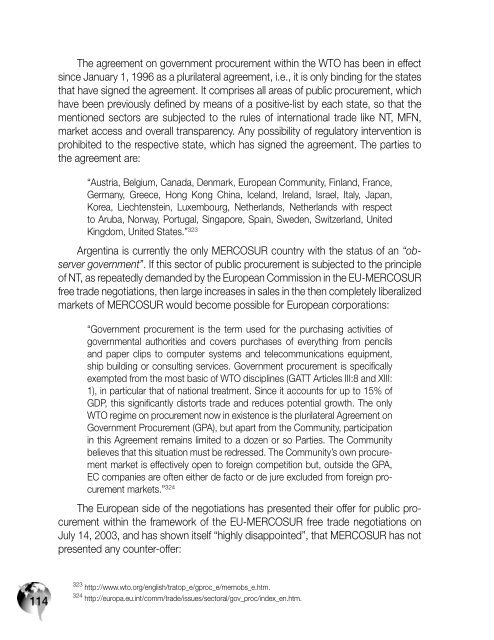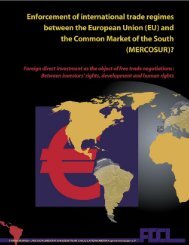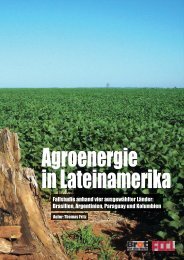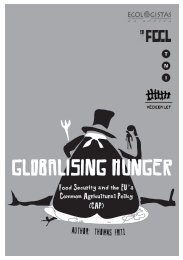(EU) and the Common Market of the South (MERCOSUR)? - FDCL
(EU) and the Common Market of the South (MERCOSUR)? - FDCL
(EU) and the Common Market of the South (MERCOSUR)? - FDCL
Create successful ePaper yourself
Turn your PDF publications into a flip-book with our unique Google optimized e-Paper software.
114<br />
The agreement on government procurement within <strong>the</strong> WTO has been in effect<br />
since January 1, 1996 as a plurilateral agreement, i.e., it is only binding for <strong>the</strong> states<br />
that have signed <strong>the</strong> agreement. It comprises all areas <strong>of</strong> public procurement, which<br />
have been previously defined by means <strong>of</strong> a positive-list by each state, so that <strong>the</strong><br />
mentioned sectors are subjected to <strong>the</strong> rules <strong>of</strong> international trade like NT, MFN,<br />
market access <strong>and</strong> overall transparency. Any possibility <strong>of</strong> regulatory intervention is<br />
prohibited to <strong>the</strong> respective state, which has signed <strong>the</strong> agreement. The parties to<br />
<strong>the</strong> agreement are:<br />
“Austria, Belgium, Canada, Denmark, European Community, Finl<strong>and</strong>, France,<br />
Germany, Greece, Hong Kong China, Icel<strong>and</strong>, Irel<strong>and</strong>, Israel, Italy, Japan,<br />
Korea, Liechtenstein, Luxembourg, Ne<strong>the</strong>rl<strong>and</strong>s, Ne<strong>the</strong>rl<strong>and</strong>s with respect<br />
to Aruba, Norway, Portugal, Singapore, Spain, Sweden, Switzerl<strong>and</strong>, United<br />
Kingdom, United States.” 323<br />
Argentina is currently <strong>the</strong> only <strong>MERCOSUR</strong> country with <strong>the</strong> status <strong>of</strong> an “observer<br />
government”. If this sector <strong>of</strong> public procurement is subjected to <strong>the</strong> principle<br />
<strong>of</strong> NT, as repeatedly dem<strong>and</strong>ed by <strong>the</strong> European Commission in <strong>the</strong> <strong>EU</strong>-<strong>MERCOSUR</strong><br />
free trade negotiations, <strong>the</strong>n large increases in sales in <strong>the</strong> <strong>the</strong>n completely liberalized<br />
markets <strong>of</strong> <strong>MERCOSUR</strong> would become possible for European corporations:<br />
“Government procurement is <strong>the</strong> term used for <strong>the</strong> purchasing activities <strong>of</strong><br />
governmental authorities <strong>and</strong> covers purchases <strong>of</strong> everything from pencils<br />
<strong>and</strong> paper clips to computer systems <strong>and</strong> telecommunications equipment,<br />
ship building or consulting services. Government procurement is specifically<br />
exempted from <strong>the</strong> most basic <strong>of</strong> WTO disciplines (GATT Articles III:8 <strong>and</strong> XIII:<br />
1), in particular that <strong>of</strong> national treatment. Since it accounts for up to 15% <strong>of</strong><br />
GDP, this significantly distorts trade <strong>and</strong> reduces potential growth. The only<br />
WTO regime on procurement now in existence is <strong>the</strong> plurilateral Agreement on<br />
Government Procurement (GPA), but apart from <strong>the</strong> Community, participation<br />
in this Agreement remains limited to a dozen or so Parties. The Community<br />
believes that this situation must be redressed. The Community’s own procurement<br />
market is effectively open to foreign competition but, outside <strong>the</strong> GPA,<br />
EC companies are <strong>of</strong>ten ei<strong>the</strong>r de facto or de jure excluded from foreign procurement<br />
markets.” 324<br />
The European side <strong>of</strong> <strong>the</strong> negotiations has presented <strong>the</strong>ir <strong>of</strong>fer for public procurement<br />
within <strong>the</strong> framework <strong>of</strong> <strong>the</strong> <strong>EU</strong>-<strong>MERCOSUR</strong> free trade negotiations on<br />
July 14, 2003, <strong>and</strong> has shown itself “highly disappointed”, that <strong>MERCOSUR</strong> has not<br />
presented any counter-<strong>of</strong>fer:<br />
323 http://www.wto.org/english/tratop_e/gproc_e/memobs_e.htm.<br />
324 http://europa.eu.int/comm/trade/issues/sectoral/gov_proc/index_en.htm.









